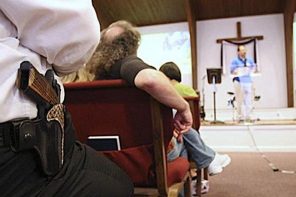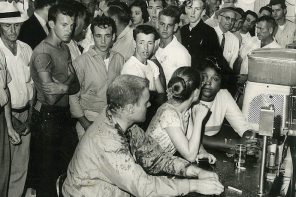It looks like the Reverend Jeremiah Wright is not going to disappear from the front pages any time soon, even though Barack Obama may sometimes wish that he would. (According to the New York Times, “associates of Mr. Obama said privately that his campaign was furious at Mr. Wright’s decision to step forward so publicly, but that they were unable to do anything to control this.”)
Rev. Wright himself says he wishes he could be removed from the political arena, so that responses to him won’t get mixed up with responses to his most famous former parishioner. He’s just a preacher, Wright insists. He’s not the one running for president—though he did joke that he might be considered for vice-president.
But wait a minute. If Rev. Wright is going to be stuck in the middle of presidential politics, like it or not, perhaps the second slot on the ticket is aiming too low. Why not “Jeremiah Wright for President”?
Age is not a problem. He’s six years younger than the oldest candidate, whose age has not stopped him from running neck-and-neck with his Democratic opponents. Racial identity is not a problem. He shares the same African-American identity as a candidate who is running neck-and-neck with his prospective Republican foe. And he has twenty years more experience than Obama in the rough-and-tumble of Chicago political life.
So Rev. Wright passes all the demographic tests for the highest office. He also surely passes the test that more voters insist on than any other: He can believably assert that he is not now, and has never been, an atheist. The one test he cannot pass is the one the mainstream media insist on, more than any other: He will not hide, or put a happy face on, the most urgent and painful truths of American political life. Where his most famous former parishioner will take tiny steps toward facing these truths, the pastor takes the full leap.
And that’s just why I’m floating the idea of running him for president.
How about, for once, a candidate who is actually candid, who says openly: “There is no excuse for the things that the government, not the American people, have done; a government whose policies grind under people.”
How about a candidate who interprets the biblical dictum, “Do unto others as you would have them do unto you,” to mean that “you cannot do terrorism on other people and expect it never to come back on you,” clearly implying the obvious, which polite people aren’t supposed to mention it in public: The US government had indeed committed terrorism against others before the 9/11 attack.
How about a candidate who says eloquently: “Being different does not mean one is deficient. It simply means one is different, like snowflakes, like the diversity that God loves. The other who stands before us with a different color of skin, a different texture of hair, different music, different preaching styles and different dance moves; that other is one of God’s children just as we are, no better, no worse, prone to error and in need of forgiveness just as we are.”
How about a candidate who openly castigates the media for squeezing the infinite complexities of politics into simplistic soundbites, devoid of all context.
How about a candidate who calls white America to confront the full effect of all these abuses and more, the effects on its people of color who will some day soon be the nation’s majority? How about a candidate who defers any call for unity until there is, first, honesty and justice?
How about a candidate who says all this and then adds: “That doesn’t make me not like America, or unpatriotic.” Indeed, he has good reason to believe that telling the truth about the nation makes him more patriotic than most.
How about a candidate who is so committed to truth that he’ll speak out even though he knows it may harm the political fortunes of one of his former parishioners? Imagine having a president who thinks that truth is more important than gaining the presidency.
Actually, I have imagined that for a long time, thinking about another African-American minister of the Gospel who spoke truth powerfully and (in my imagination, at least) might have become president, had he lived longer than 39 years.
And there’s not a whole lot of difference between the substantive message of the one black minister, whose birthday we celebrate as a national holiday, and the other, who has become the whipping boy of many liberal, as well as nearly all conservative, journalists. (Three headlines from the centrist and mightily influential Washington Post Web site: “Wright Stirs Race Controversy,” “Wright Could Spell Doom for Obama,” “Obama’s Latest Test in a Long Line.”)
The Rev. Dr. Martin Luther King Jr. thundered from the pulpit against the white American penchant for turning difference into deficiency and denying the value of diversity. He expressed full understanding of the anger that fueled the cry for Black Power, though he tried to steer that anger into unyielding yet nonviolent resistance. He famously called the US government “the greatest purveyor of violence in the world today.” And he never hesitated to condemn the US government for a long list of other immoral policies. He was simply polite enough to avoid turning “con-demn” into “damn.”
Or perhaps it was not politeness but a shrewdly calculated knowledge of just how far his condemnations could go, and how they could be phrased, without undermining his eloquent expressions of American patriotism. Dr. King never pleaded to have his patriotism credited. He didn’t have to. He just insisted, over and over again, that he had come to call white America back to its own highest ideals. He wasn’t asking for any new values, he said (though he might have been wrong about that). He was only asking that the old traditional values, still the highest values we know, be lived up to.
Why, then, do we idolize the one black minister while criticizing, or at best remaining neutral about, the other? Is it because one is long dead while the other is very much alive? Or is it a matter of personalities and personal style, some ingratiating and others more irritating? If it is a matter of style, then that raises the question that may be most urgent this year: Do we really want our presidential elections (or any elections, for that matter) to be personality contests? Isn’t there a better way?
But if personality is inevitably a central factor, it is worth remembering that we once had a political leader who combined the elegantly beguiling style of Barack Obama with the fierce critical substance of Rev. Jeremiah Wright, which shows what patriotism is at its best. Will we ever see another such leader rise to the heights of political fame and glory? Perhaps, but not this year.
[For a different take on Rev. Wright’s comments and the concept of the “jeremiad,” see Andrew Murphy’s feature, here —ed.]



